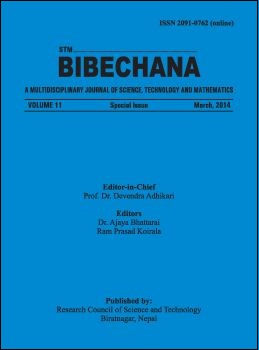Dark Matter and Dark Energy in the Universe
DOI:
https://doi.org/10.3126/bibechana.v11i0.10374Keywords:
Dark Matter, Dark Energy, Stable galaxy, Late Universe.Abstract
Cosmological and astronomical observations predict that the present Universe is passing through an accelerating phase of expansion. The Universe emerged out of an exponential phase in the very early Universe. The scalar field of the standard model of particle physics when used in cosmology admits such a phase of expansion known as inflation. The most favourable condition for inflation with scalar field to admit an Inflationary scenario is that the potential energy must dominate over the kinetic energy which one obtains with a flat potential. Thereafter the Universe enters into a matter dominated phase when the field oscillates at the minimum of the potential. But it is not possible to accommodate the present accelerating phase in the Einstein’s gravity. It is known from observational analysis that about 73 % matter is responsible for the late phase expansion and 23 % matter called Dark Matter is responsible for a stable galaxy. We discuss here the relevant fields and theories that are useful for describing the late Universe.
DOI: http://dx.doi.org/10.3126/bibechana.v11i0.10374
BIBECHANA 11(1) (2014) 8-16
Downloads
Downloads
Published
How to Cite
Issue
Section
License
This license enables reusers to distribute, remix, adapt, and build upon the material in any medium or format for noncommercial purposes only, and only so long as attribution is given to the creator.




